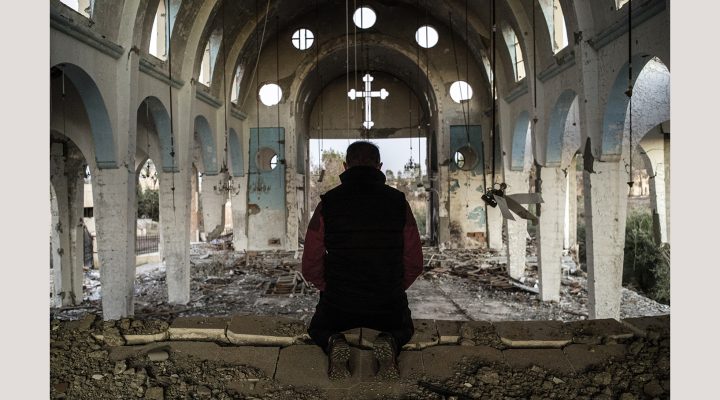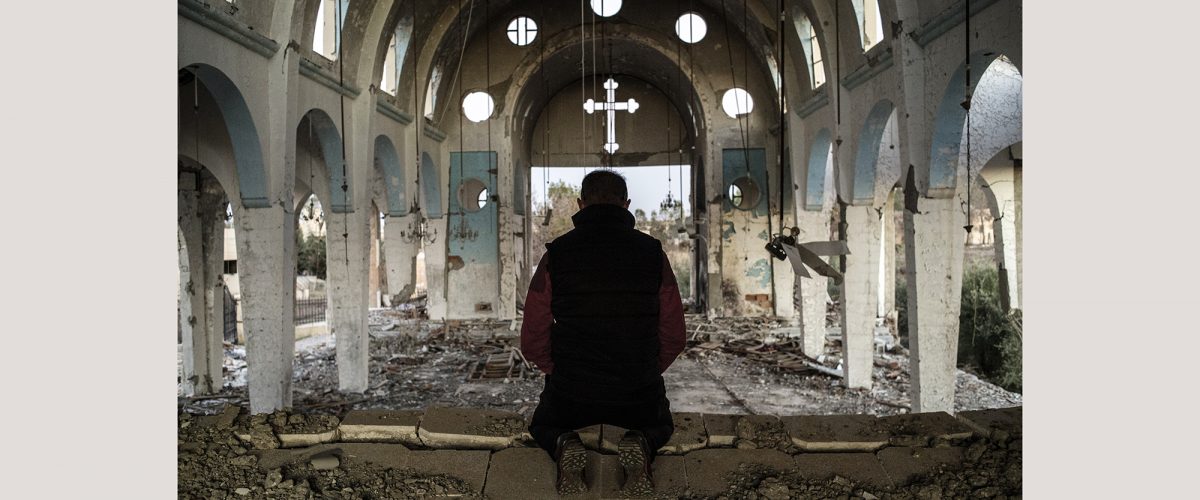The United States can help alleviate the suffering of persecuted Christians worldwide by restoring its refugee resettlement program to pre-Trump levels and restoring due process to its asylum system, World Relief and Open Doors US said in a new report.
Churches and individual Christians, meanwhile, must pray for and stand with the persecuted and pressure their government representatives to support policies that serve the vulnerable, the Christian nonprofits added in “Closed Doors: Persecuted Christians and the U.S. Refugee and Asylum Processes,” an update of the groups’ 2020 study.
“As both the global displacement crisis and global persecution of Christians have increased, we have revised and updated this report to examine how the admission of Christian refugees from countries where Christians face severe persecution has changed — and to urge policymakers, candidates and everyday American Christians to be mindful of the impact of restrictive refugee and asylum policies on the persecuted church.”
The September report estimates more than 360 million Christians face high levels of persecution and discrimination, accounting for roughly one in seven Christians globally.
And like others fleeing violence and intimidation in their native countries, they are on the move in the hope of finding refuge in welcoming nations.
For many years, the U.S. was the leading nation refugees could count on for safety.
For many years, the U.S. was the leading nation refugees could count on for safety. Beginning with the Refugee Act of 1980 and through 2016, more than 3 million refugees, half of them Christian, were settled in the United States. The average upper ceilings for immigration set by presidents throughout that period was about 95,000, with at least 81,000 arriving each year.
“In recent years, however, the U.S. has dramatically reduced its commitment to refugee resettlement,” the report notes. “After resettling roughly 97,000 refugees in calendar year 2016, the refugee ceiling was reduced each year between 2017 and 2020,” with the COVID-19 pandemic playing a large part three years ago. “In the calendar year 2020, the U.S. resettled fewer than 10,000 refugees for the first time in the resettlement program’s history.”
Those decreases were a direct result of the Trump administration’s war on immigrants, but the lowered limits did not end with the Trump administration. President Joe Biden, who had pledged to rebuild the system dismantled by his predecessor, set the ceiling for refugees at 15,000 in 2021 before raising it to 62,500 due to political backlash, the report says. “In subsequent years, the overall number of refugees resettled has increased as the overseas processing infrastructure — significantly reduced even before COVID-19 and then entirely halted for a time by the pandemic — gradually rebuilt.”
Subsequently, 25,000 refugees were resettled the U.S. in 2022, not including Afghan and Ukrainian war refugees granted entry under temporary humanitarian parole. “The U.S. is on track to resettle approximately 60,000 refugees in 2023 if trends continue, in spite of a ceiling set at 125,000 refugees.”
Yet the numbers will do little to address the 2.4 million refugees who, according to United Nations estimates, will need resettlement in 2024.
Many Christians will be among those left in the cold, Open Doors US and World Relief said.
Many Christians will be among those left in the cold, Open Doors US and World Relief said. “While refugees of various religious traditions have been harmed by the relatively low levels of refugee resettlement to the U.S., among those disadvantaged are Christian refugees from the countries where Christians face the most severe persecution in the world.”
According to Open Doors’ World Watch List 2023, those countries include Myanmar, Iran, Afghanistan, Pakistan, India and Nigeria. Countries with “very high” levels of persecution include Saudi Arabia, Turkey, China, Indonesia, Egypt and Iraq.
“The tragic reality is that many areas of the world simply aren’t safe for Christians, and Christians fleeing persecution need a safe haven in the United States,” the ministry says.
The new report also takes issue with recent U.S. asylum policies that have added nearly insurmountable barriers to immigrants seeking refuge at the southern border and at various ports of entry.
During 2019, about 46,000 people were granted asylum by the Department of Homeland Security or by an immigration judge. Two years later, the total granted asylum declined more than 60%, in part because of pandemic-related measures implemented by the Trump administration.
One of those polices was Title 42. Touted as a health measure, the 2020 policy was used to deport immigrants and asylum seekers without access to due process provisions under U.S. law and international treaty.
When Title 42 expired in May 2023, the Biden administration implemented new rules requiring the use of an app to book asylum appointments, a move that effectively strands migrants in Mexico as they await appointments many never get. The administration also requires migrants to show proof they sought asylum in other countries enroute to the U.S. The asylum ban was ruled illegal by a federal judge in July but remains in effect pending appeal.
“Asylum cases can be difficult to win, even when the asylum seeker has legitimately fled persecution.”
And the struggle isn’t over for immigrants even when they do get an asylum hearing in the U.S., the “Closed Doors” report adds. “Asylum cases can be difficult to win, even when the asylum seeker has legitimately fled persecution. This is because the burden of proof in an asylum case is on the asylum seeker, and often they lack documentary evidence of what they claim to have experienced.”
The U.S. church cannot sit by as the fate of refugees hangs in the balance, the groups declare. “With religious persecution of Christians at some of the highest levels ever reported, closing the door to refugees and asylum seekers threatens the lives of Christians — and American Christians must not remain silent.”

Myal Greene
World Relief President Myal Greene expressed confidence American believers are concerned about their oppressed brothers and sisters around the world. “American Christians care deeply about our brothers and sisters around the world who face persecution on account of their faith. Robust refugee and asylum policies are among the most vital tools to offer protection to those denied religious freedom in their countries of origin,” he said.

Mark Seitz
Catholic Bishop Mark Seitz of El Paso said he and other prelates accept the report as a warning of the grave conditions endured by Christians around the world.
“The Catholic church remains deeply concerned about the plight of Christians and others around the world who face persecution due to their religious beliefs, as well as the sharp decline in access to protection for these populations,” he said.
Walter Kim, president of the National Association of Evangelicals, said the U.S. must strengthen its asylum system. “At a time when one in seven Christians throughout the world — 360 million Christians — faces high levels of discrimination and persecution, those of us who currently enjoy religious freedom must redouble our efforts to advocate for those of every religion whose lives and livelihoods are at risk.”


